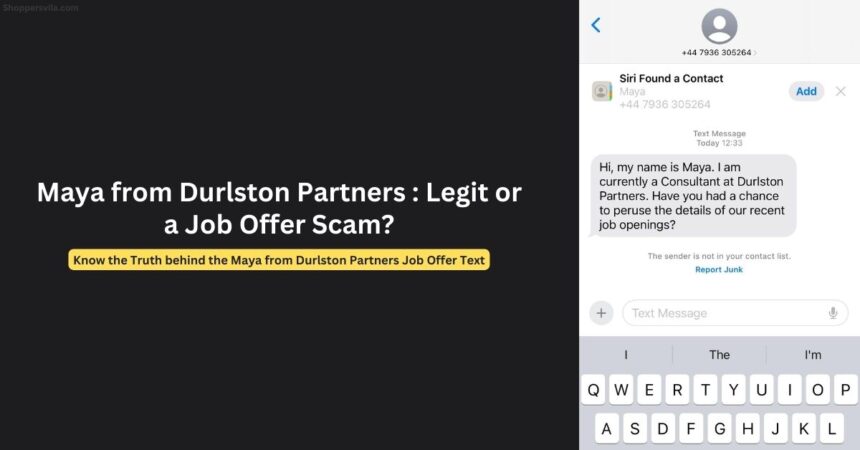In recent weeks, professionals across various industries have been receiving seemingly promising text messages from someone named “Maya” claiming to be a consultant at Durlston Partners, a legitimate talent firm. However, Durlston Partners has confirmed these messages are part of an elaborate scam designed to collect personal information from unsuspecting job seekers. This scam joins the growing trend of recruitment fraud that continues to plague the job market, leaving victims vulnerable to identity theft and financial loss.
Overview of the Durlston Partners Impersonation Scam
Durlston Partners, a specialist talent organization in the tech, cyber, and security fields, has issued an urgent warning through their LinkedIn profile about scammers impersonating their company. According to their announcement, an individual identifying as “Maya” has been sending unsolicited job offers via text messages from multiple UK phone numbers, targeting professionals even outside their industry.
Shannon Palmer, Partner and Head of Business Strategy & Operations at Durlston Partners, confirmed the company is actively investigating these incidents and has reported them to Action Fraud UK. “We have reported and I am collating evidence,” Palmer stated in response to LinkedIn users sharing screenshots of the fraudulent messages they received.
The scam appears to be widespread, with numerous professionals commenting on Durlston’s LinkedIn post that they had received similar messages. What makes this scam particularly concerning is its targeted approach toward working professionals rather than just active job seekers.
How the Scam Works: Message Patterns and Tactics
The fraudulent messages follow consistent patterns, typically beginning with a formal introduction claiming association with Durlston Partners and offering immediate job opportunities. Some of the recurring message templates include:
Good day, I work as a consultant with the Durlston Partners. I would like to extend a job offer to you. Can I give you the details? My name is Maya.
Hi, my name is Maya. I am currently a Consultant at Durlston Partners. Have you had a chance to peruse the details of our recent job openings?
These messages exhibit several classic recruitment scam characteristics:
- Unsolicited contact – The messages arrive without any prior application from the recipient
- Immediate job offers – The scammer offers positions without proper screening or interviews
- Formal but vague language – The wording is professional-sounding but lacks specific details
- Creating urgency – The scammer tries to engage recipients quickly before they can verify the legitimacy
According to one recipient who commented on LinkedIn, the messages appear “obviously a scam as it’s painful to read,” suggesting that while the scammers attempt to seem professional, linguistic inconsistencies often reveal their fraudulent nature.
Tracking the Scam: Reported Phone Numbers
Vigilant professionals have reported multiple UK phone numbers (+44) being used in this scam operation, suggesting a coordinated effort rather than an isolated incident. Numbers reported by recipients include:
- +44 7724 578202
- +44 7936 305264
- +44 7708 587634
- +44 7871 720070
- +44 7394 392921
- +44 7708 586399
- +44 7708 583902
- +44 7936 305284 (reported by LinkedIn user George John Stones)
- +44 7708 520663 (reported by LinkedIn user Gary Milbourn)
The use of multiple phone numbers is a common tactic in such scams, making them harder to shut down and track. As one number gets reported and blocked, scammers simply move to another, continuing their operation with minimal disruption.
Official Response: Durlston Partners Takes Action
Durlston Partners has taken a proactive approach in addressing this fraud by:
- Issuing a public warning on LinkedIn
- Reporting the scam to Action Fraud UK, the UK’s national fraud reporting center
- Actively collecting evidence from affected individuals
- Encouraging recipients to block and report the numbers
In their LinkedIn statement, Durlston Partners expressed concern not only about damage to their business reputation but also about the stress caused to job seekers: “Impersonation like this not only impacts business reputations but can also cause a lot of stress for job seekers, especially in a challenging market. We completely understand how frustrating this must be.”
This response highlights the dual victims of such scams: both the impersonated company and the targeted individuals.
The Broader Problem: The Rise of Recruitment Scams
The Durlston Partners impersonation is just one example of a growing trend in recruitment fraud. According to recent reports, recruitment scams reported to Action Fraud have been increasing, with scammers exploiting reputable job websites and impersonating legitimate companies.
These scams typically follow similar patterns:
- Impersonation of legitimate businesses – Scammers use real company names to appear credible
- Multi-channel approach – Using job boards, WhatsApp, text messages, and even phone calls
- Well-crafted job postings – Creating convincing advertisements with attractive salaries
- Information harvesting – Requesting sensitive personal and financial information
- Identity theft – Using collected information for financial fraud or identity theft
The impact extends beyond immediate financial loss. Some victims have reported hard credit checks appearing on their credit reports after sharing documents with scammers, indicating attempts at more sophisticated identity fraud. In severe cases, individuals have quit existing jobs expecting to start fake positions, only to discover no such job exists.
Red Flags: How to Identify Recruitment Scams
To protect yourself from recruitment scams like the Durlston Partners impersonation, watch for these warning signs:
Contact Method Red Flags
- Unsolicited job offers for positions you never applied for
- Text messages or WhatsApp communications instead of professional email channels
- Personal email addresses rather than company domains
- Messages with poor grammar or unprofessional language
Process Red Flags
- Immediate job offers without proper interviews or screening
- Rushed recruitment processes with pressure to respond quickly
- Vague job descriptions lacking specific details about responsibilities
- Missing employer contact information or lack of verifiable company details
Financial and Personal Information Red Flags
- Requests for personal banking details early in the process
- Requests for identity documents before a formal offer
- Upfront payment requirements for training, equipment, or administrative fees
- Unrealistically high salary offerings compared to industry standards
Many victims of the Durlston Partners scam noted that checking LinkedIn immediately after receiving the suspicious text was what alerted them to the fraud. As one LinkedIn user commented: “Just received a message from Maya. Thank God I checked LinkedIn right after.”
Protecting Yourself: Essential Steps to Avoid Job Scams
If you receive an unsolicited job offer that seems suspicious, follow these protective measures:
Verify the Source
- Research the company through their official website, not links provided in messages
- Contact the company directly through official channels to confirm job openings
- Check professional networks like LinkedIn for company announcements or warnings
- Search online for the recruiter’s name combined with words like “scam” or “fraud”
Safeguard Your Information
- Never provide financial information (bank details, credit card numbers) to potential employers before formal employment
- Be cautious with personal documents such as passports or drivers’ licenses
- Never transfer money to secure a position or as part of an application process
- Use secure, professional channels for sharing necessary information
Trust Your Instincts
- If an offer seems “too good to be true,” it likely is
- Take time to evaluate opportunities, legitimate employers will understand
- Seek second opinions from trusted friends or family if unsure
- Report suspicious activity to the company being impersonated
The Recruitment and Employment Confederation (REC), representing the UK recruitment industry, emphasizes that legitimate recruiters will never ask job seekers for payment to find work, as this is illegal.
What To Do If You’ve Been Targeted by Maya from Durlston Partners
If you’ve received messages from “Maya” claiming to be from Durlston Partners or have encountered similar recruitment scams:
- Do not respond to the message or provide any personal information
- Block and report the phone number
- Contact the real company through their official channels to report the impersonation
- Report to authorities such as Action Fraud in the UK
- Alert others in your professional network about the scam
- Monitor your accounts and credit if you’ve shared any personal information
The Bigger Picture: Combating Recruitment Fraud
The rise in recruitment scams reflects broader trends in cyber fraud, with criminals adapting tactics to exploit current job market vulnerabilities. A Home Office spokesperson noted there were an estimated 3.2 million fraud offenses in the year ending September 2023, though this represented a 13% decrease from the previous year.
Initiatives to combat these scams include:
- The launch of a national fraud squad
- Enhanced support for victims across England and Wales
- The “Stop! Think Fraud” public awareness campaign
For job seekers, vigilance remains the best defense. As one LinkedIn user commented regarding the Durlston Partners scam: “It’s good that you put out a post informing us it’s a scam!” This highlights the importance of companies taking proactive measures when their brand is being used fraudulently.
As recruitment fraud continues to evolve, staying informed about current scam techniques and maintaining healthy skepticism toward unsolicited opportunities will be essential tools in protecting your personal information and financial security in an increasingly complex job market.
































